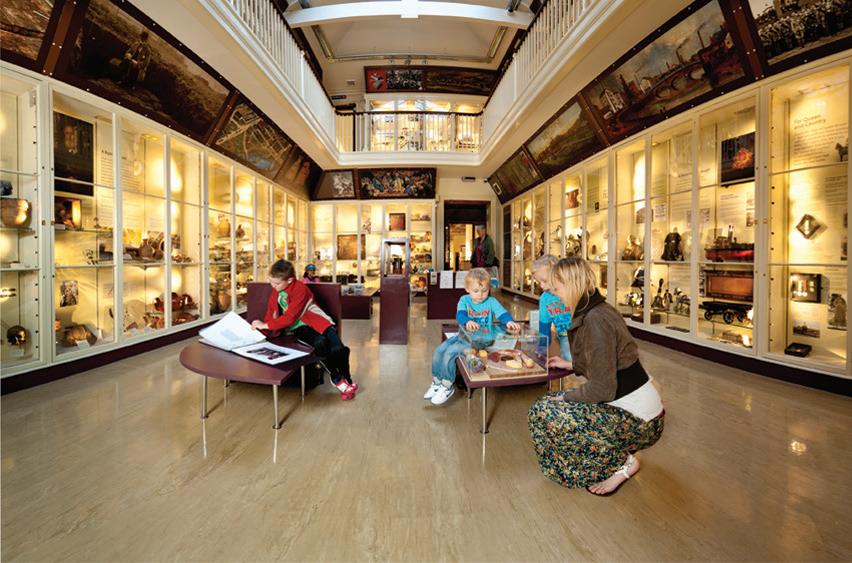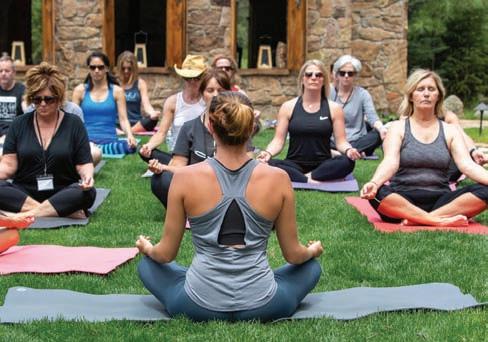
3 minute read
Swimming
West Craven sports Centre in Barnoldswick, Lancashire, has introduced dementiafriendly swimming sessions. The joint initiative, organised between centre operator Pendle Leisure Trust and charity Dementia Positive Pendle, aims to engage with people living with dementia – and to offer them opportunities to continue to do things they enjoy.
specially-designed clear and simple signage has been introduced to help visitors find their way around the facility easily – and into the pool for the weekly sessions. "We know people living with dementia start to disengage with the outside
world and doing something they have always enjoyed becomes a lot harder," said Julia O’Neill from Dementia Positive Pendle. "Through partnership like these, we want to make our community inclusive and unite people who are living with dementia, helping and encouraging them to be active in a non-threatening way.
"We do not want to isolate these people, we want to offer some therapeutic respite and West Craven sports Centre is the perfect environment, so when they get in the water they remember how they used to enjoy swimming." More: http://lei.sr/7v3w9_O Read moRe online
■■The sessions are designed to engage with dementia suff erers

We do not want to isolate these people, we want to off er some therapeutic respite Julia O'Neill
training RLSS and GLL sign training partnership

The Royal Life saving society (RLss) and Greenwich Leisure Limited (GLL) have signed a partnership agreement for the delivery of swimming pool lifeguarding courses for the next three years until the end of 2022. The secure training partnership has been devised to "save money and provide guarantee the highest standards in GLL’s pools", while providing staff with sustainable career pathways. Robert Gofton, CeO of RLss uK said the partnership will also have a focus on "encouraging more
■■The partners signed the deal in february

people from all backgrounds to join the lifeguarding community".
"We believe that lifeguards should reflect our wider society and that everyone, irrespective of their background, disability, faith, gender, race and sexual orientation, should be able to take advantage of the many benefits of lifeguarding," Gofton said. More: http://lei.sr/p8p2r_O Read moRe online
trends GWS releases 2020 Trends Report
Religion and wellness, music as medicine and circadian health are some of the GWs’ 2020 predicted wellness trends, just released in its 2020 Global Wellness Trends Report. The annual publication forecasts ten new trends for the year ahead in health and wellness, with individual chapters dedicated to each trend. the 10 trends are: 1. Focus shifts from sleep to true circadian health 2. Ageing rebranded: positively cool 3. J-wellness (Japanese Wellness) 4. Mental wellness and technology: rethinking the relationship
5. energy medicine gets serious 6. Organised religion jumps into wellness 7. The wellness sabbatical 8. The fertility boom 9. Wellness music 10. In wellness, we trust: the science behind the industry Beth McGroarty, director of research at GWs and co-author of the Trends Report, said: "Wellness used to be comprised of more discrete, siloed markets, such as the fitness or spa industries, but now everything is converging in, and around, wellness, and the concept is remaking whole industries and categories of living". More: http://lei.sr/Z5y4g_O Read moRe online
■■Religion and wellness will be a big trend in 2020

research Helping guests conquer sadness and binge eating
Anthropomorphic thinking enables individuals to view sadness as an independent human being that is separate from them Li Yang spa operators could help guests reduce feelings of sadness, successfully conquer binge-eating challenges and improve self-control and discipline, using learnings from new research published in the Journal of Consumer Psychology. Called When sadness comes alive, will it be less painful?, the research found that thinking of sadness as a ‘person’ can reduce its effects.
Authored by Li Yang, the study explores how anthropomorphic thinking influences people’s experience of sadness and their subsequent behaviour as consumers.
■■Thinking of sadness as a ‘person’ reduces its effects

"We found that anthropomorphic thinking enables individuals to view sadness as an independent human being that is separate from them and consequently creates a feeling of detachment," Yang told Leisure Opportunities. More: http://lei.sr/J6h8g_O Read moRe online









